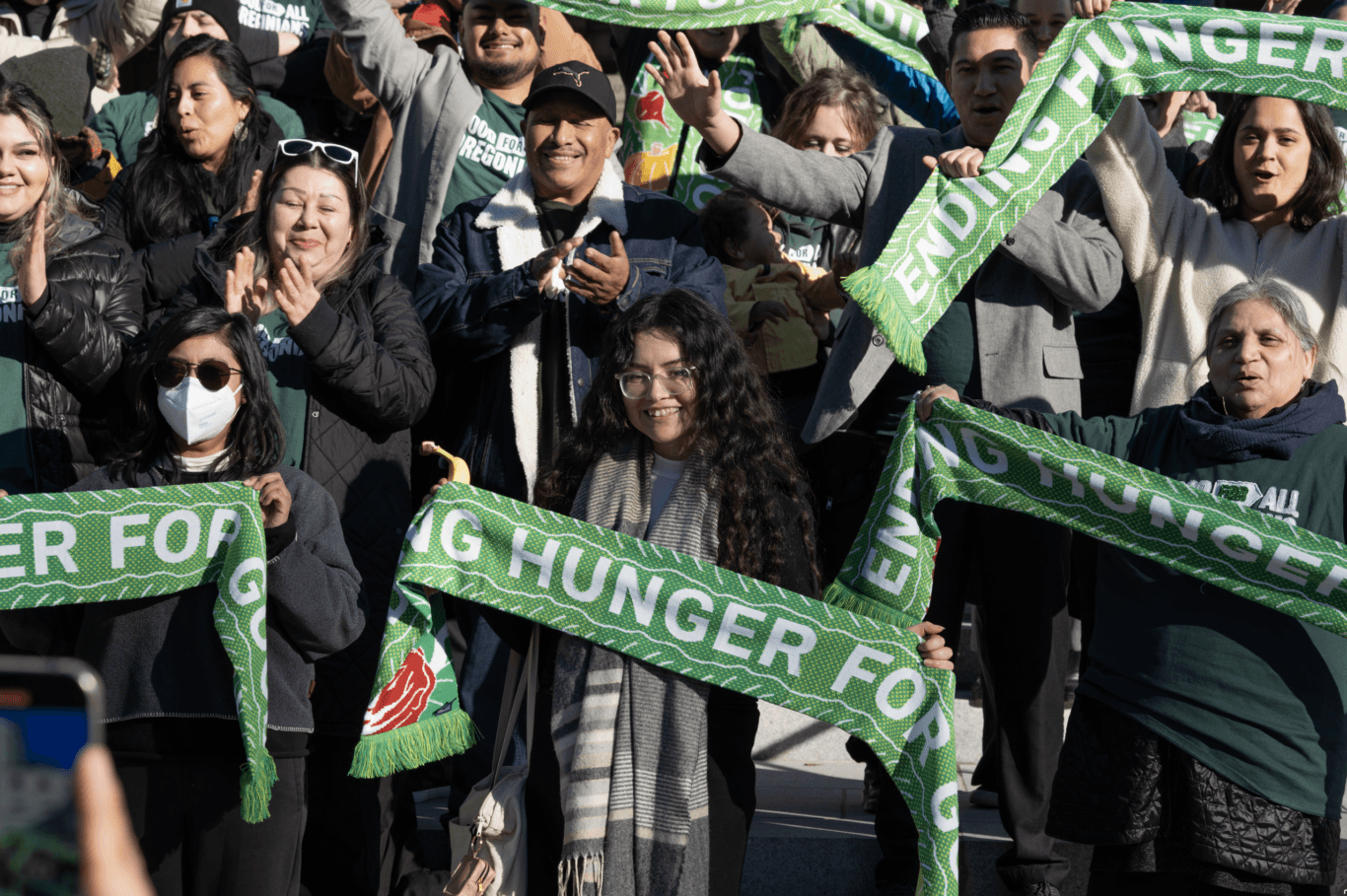Suleiman Amanzad, Oregon Food Bank director of strategic communicationsOur job is to counter harmful narratives with the truth. With every story we tell, we are helping more people understand that hunger is actually caused by long-term patterns and systems that no amount of individual effort can fix.
Change the story and change what’s possible
Change the story and change what’s possible
Rooted + Rising is an $80 million campaign to create a future free from hunger.
At Oregon Food Bank, changing the narrative is core to our work. We’re reframing how our community talks about hunger and poverty — and who gets to do the talking. The stakes are high: The stories we tell shape what we see and what we ignore. They influence both public attitudes and public policy.
FALSE NARRATIVE
Often called the “bootstrap narrative” or “the American dream,” this story tells us that anyone can succeed in the United States if they work hard. You just have to pull yourself up by your bootstraps! Or dare to dream! Struggling to afford food? You must be lazy. There are no facts to support this old narrative, but it still drives harmful public policies such as restrictive eligibility rules for programs like the Supplemental Nutrition Assistance Program.
Our Strategic Communications team produces videos, blogs and social media posts that elevate the stories of people who’ve experienced hunger. When someone shares their story, it’s a profound act of generosity — a gift as meaningful as any donation. Their stories are critical to exposing the deeper forces that drive hunger (like low wages and housing discrimination), countering the myth that individual choices are to blame.
Iván Hernandez, Oregon Food Bank associate director of strategic communications.Our goal is to amplify the voices of real people as we work to end hunger and its root causes.
TRUE STORY
Liliana Beltran Torres sees the true story of hunger every day as a food distribution coordinator and community health worker for the Nuevo Futuro program at AntFarm Youth Services in Clackamas County.
Liliana Beltran TorresI see families with single parents and families that have an elderly family member living with them. They get up very early in the morning, they go to work, and still — working as hard as they do, getting up as early as they do — they are not able to meet their basic needs.
Changing the narrative isn’t just about telling better stories, however. It’s also about understanding your audience. With support from Rooted + Rising, we launched a research initiative in 2024 to better understand how our communities talk about hunger — and which narratives they rely on to explain why it persists in their neighborhoods.
New insights emerge
With phone polls, surveys and focus groups, we included perspectives from urban, suburban and rural Oregon, with intentional oversampling of BIPOC, Spanish-speaking and ideologically conservative participants from beyond the Portland metro area.
Morgan Dewey, Oregon Food Bank media and engagement managerI used to think it was enough to just share more stories. But I’ve learned it’s really about how we tell them — and who is sharing. Narrative change is movement work — it challenges the status quo and helps folks see hunger for what it truly is: a systemic issue we can take on together. That shift in perspective is powerful.
What we learned confirmed some of what we already knew and challenged us to do better.
KEY TAKEAWAYS
- >4 in 5 agree that food is a human right
- 70% Are supportive of our work to advocate for laws that help end hunger and its root causes
- Participants responded best to clear, simple messages that used everyday language
- 78% agree that cost of living, housing, and poverty are key causes of hunger
- >25% of research participants have personally used food bank services
- 7 in 10 Oregonians are concerned about people going hungry in their community
This work is already shaping the way Oregon Food Bank talks about hunger. We’ve revised our high-level messages, tested new ways of talking about systems change and focused on being more direct and accessible in everything we publish.
"My priority isn’t to knock down old stories but to lift up a new narrative,” said Suleiman. “By using the everyday language people already understand, we make our message more accessible and extend our reach. As more people adopt this fresh way of talking about hunger, they’ll be driven to act — and over time, that collective action will reshape policy and systems."
Over the next four years, we’ll continue testing and refining our message framework to better connect with the people we need to reach most. We will also continue to collaborate with community members whose authentic stories so eloquently contradict false narratives like the old bootstraps myth.
Narrative change doesn’t happen overnight, but it’s essential to building public support for just policies. When we change the stories we tell, we open the door for empathy, action and real change.
TRUE STORY
Indigenous farmer Michelle Week understands displacement, survival and bringing First Foods back to her community.
Michelle WeekWe’re the original land tenders here. We had lived here for thousands of years and found a way to live here in harmony with our ecosystem and our fellow beings. It’s been difficult to realize that all this land was stolen Native land, and I also have to pay over a half a million dollars to access some land that would make this farm viable and successful forever.
Related posts
Rooted + Rising: Amplifying Community Power
Rooted + Rising strengthens immigrant justice in Oregon
Rooted + Rising: Amplifying Community Power
